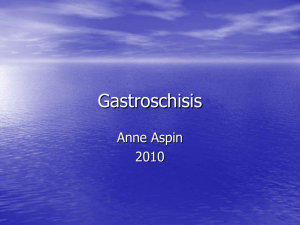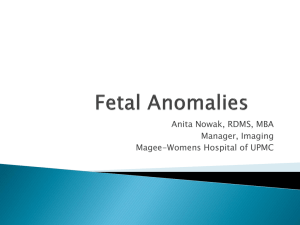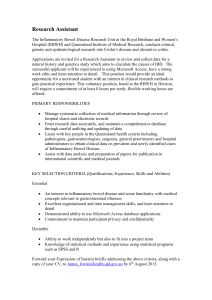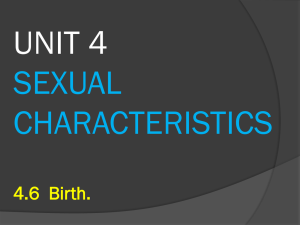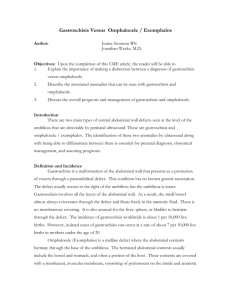Gastroschisis
advertisement
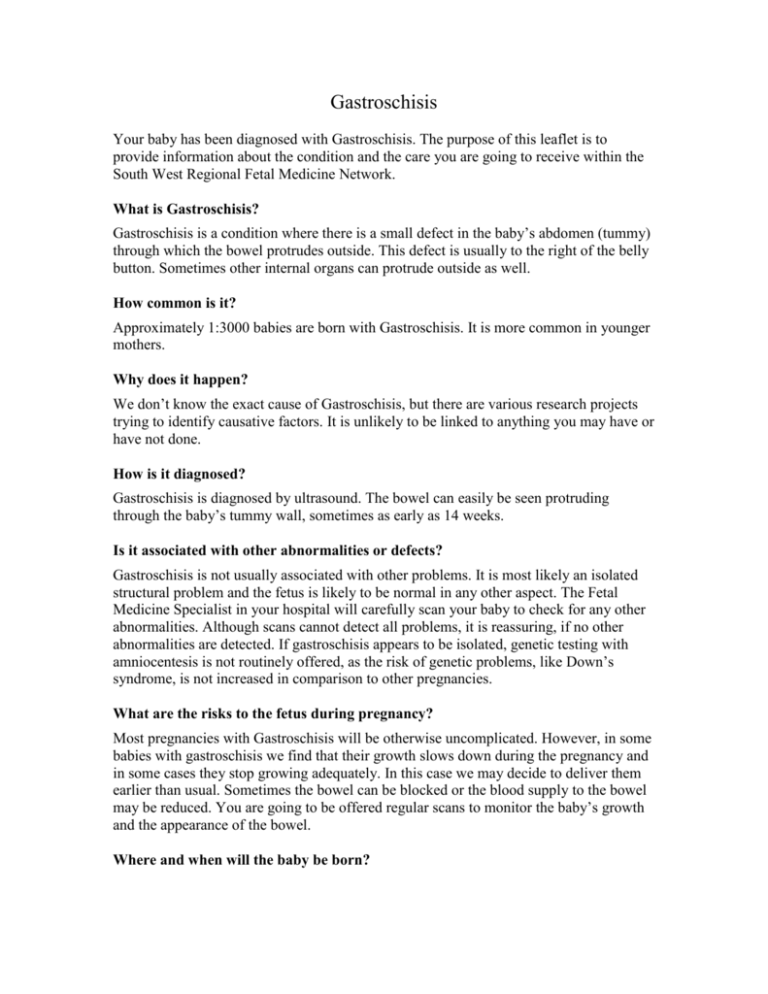
Gastroschisis Your baby has been diagnosed with Gastroschisis. The purpose of this leaflet is to provide information about the condition and the care you are going to receive within the South West Regional Fetal Medicine Network. What is Gastroschisis? Gastroschisis is a condition where there is a small defect in the baby’s abdomen (tummy) through which the bowel protrudes outside. This defect is usually to the right of the belly button. Sometimes other internal organs can protrude outside as well. How common is it? Approximately 1:3000 babies are born with Gastroschisis. It is more common in younger mothers. Why does it happen? We don’t know the exact cause of Gastroschisis, but there are various research projects trying to identify causative factors. It is unlikely to be linked to anything you may have or have not done. How is it diagnosed? Gastroschisis is diagnosed by ultrasound. The bowel can easily be seen protruding through the baby’s tummy wall, sometimes as early as 14 weeks. Is it associated with other abnormalities or defects? Gastroschisis is not usually associated with other problems. It is most likely an isolated structural problem and the fetus is likely to be normal in any other aspect. The Fetal Medicine Specialist in your hospital will carefully scan your baby to check for any other abnormalities. Although scans cannot detect all problems, it is reassuring, if no other abnormalities are detected. If gastroschisis appears to be isolated, genetic testing with amniocentesis is not routinely offered, as the risk of genetic problems, like Down’s syndrome, is not increased in comparison to other pregnancies. What are the risks to the fetus during pregnancy? Most pregnancies with Gastroschisis will be otherwise uncomplicated. However, in some babies with gastroschisis we find that their growth slows down during the pregnancy and in some cases they stop growing adequately. In this case we may decide to deliver them earlier than usual. Sometimes the bowel can be blocked or the blood supply to the bowel may be reduced. You are going to be offered regular scans to monitor the baby’s growth and the appearance of the bowel. Where and when will the baby be born? It is recommended that the baby is born in Bristol, as the surgical services for the Southwest region are based in Bristol, and the baby will need an operation soon after birth to replace the bowel and close the opening on the tummy wall. You will normally give birth at St Michael’s Hospital, Bristol. Induction of labour is usually arranged at 37 weeks or soon after, as the risk of problems to the fetus appears to be increased in late pregnancy. Usually, normal delivery is desirable, as there is no advantage in having a caesarean section for babies with Gastroschisis. Sometimes, the induction of labour can be delayed by several days, if there are no empty cots in the Neonatal Intensive Care Unit. The delay is likely to be at short notice, as the Neonatal Intensive Care Unit accepts emergencies from the whole of the Southwest region. You will be kept informed, if this happens. You can discuss more about the process of induction of labour with your midwife. Will I visit Bristol before birth? Your local Fetal Medicine team will arrange for you to visit St Michael’s Hospital at 3034 weeks. You will have an ultrasound scan to assess the baby’s wellbeing and will meet a paediatric surgeon to discuss surgery and care after birth. You will have an opportunity to visit the Delivery Suite and the Neonatal Intensive Care Unit. Your details will also need to be entered in the St Michael’s computer system, so you should expect your visit to last 3-4 hours. What happens if labour starts early? If you think your labour may have started, you should attend your local hospital rather than Bristol. You will be assessed there and a transfer to Bristol may be arranged, if considered safe. What happens after birth? The baby will need an operation soon after birth (usually within 24 hours) to replace the bowel and close the opening on the tummy wall. Often this cannot be done in a single operation; in this case, the bowel is protected with a plastic cover which is gradually reduced in size and replaces the bowel in the tummy. When the entire bowel is in the abdomen, another operation will be needed to close the hole in the tummy wall. The bowel may take a long time to work normally and the baby will be fed through a drip in a vein. It may take many weeks for the bowel to work normally and therefore the baby may stay in hospital for up to 2-3 months. Out of 20 babies with Gastroschisis, 18-19 babies will do well and grow up as normal children. 1-2 babies may have serious and prolonged problems. There is more info at: http://www.geeps.co.uk/
